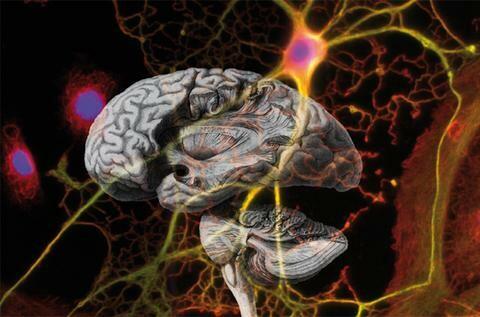
Master Neurosciences
The Neuroscience Master's Program allows students to explore the full spectrum of neuroscience—from cognition to the molecular processes that shape brain function. This comprehensive program delves into areas like neurophysiology, cellular dynamics, and molecular neuroscience.
Students gain a strong expertise with key methodologies such as behavioral studies, electrophysiology, biochemistry, and advanced omics, using human, animal, and cellular models. This training prepares the next generation to contribute to cutting-edge research and real-world applications.
Neuroscience is essential for understanding ourselves at both individual and societal levels. Our program emphasizes not only understanding how we think, make decisions, remember, and sense the environment but also the complexities of brain dysfunctions—from psychiatric disorders to neurodegenerative diseases. It fosters an environment that encourages curiosity, rigor, and collaboration, enabling to explore both the marvels and the challenges of the brain.
The Master BIP-Neuroscience program trains students in all fields of neuroscience with:
- more than 38 teaching modules in neuroscience supported by recognized specialists (researchers, teachers/researchers, clinicians, …).
- more than 200 research teams, in France and abroad, regularly involved in our training.
- close collaboration, for teaching and research training, with the 4 Sorbonne University neuroscience institutes (Neuroscience Paris Seine, Paris Brain Institute, Institut de la Vision, Institut du Fer à Moulin), and with the Institut Pasteur and the Ecole Normale Supérieure.
- 3 international training programs in partnership with University of Heidelberg, University College London, National Autonomous University of Mexico, University of Pittsburgh.
- 10 months of internship in internationally-recognized laboratories in France or abroad.
For more information on the Neuroscience Master courses, we recommend that you read the Course Catalogue 2025-2026.
Keywords: integrated neuroscience - cognitive neuroscience - systems and computational neuroscience - behavior - development - vision - neurodegenerative diseases - psychiatric diseases
Objectives
The Neuroscience Master program provides state-of-the-art training in neurosciences. Students will develop both scientific skills and transferable skills important for other professions outside of the neuroscience field:
- Theoretical understanding of different fields within the neurosciences
- Cellular, molecular, and integrative
- Cognitive and behavioural neurosciences
- Psychiatric diseases
- Neurodegenerative diseases
- Sensory neurosciences
- Interactions with the immune system
- Practical skills applied to different neuroscience fields
- Developing and carrying out scientific experimentation in the Neurosciences
- Data management and analysis
- Critical reading of the scientific literature
- Working in a team to advance research goals
- Scientific writing
- Presentation skills
- Project management
- Creativity

The Neuroscience program extends over 2 years, with the possibility of joining directly in the 2nd year (depending on previous training).
The neurosciences are fundamentally interdisciplinary, and our program is aimed at students from many different backgrounds -- life sciences, medical training, engineering, mathematicians, computer sciences -- planning to pursue a career in neuroscience in the public or private sector.
First year open to: students with a Bachelor's degree in Life Science or Health Science.
Second year open to:
- students who have completed the M1 in neuroscience or related fields. M2 students from other fields.
- medical students in “Medecine/Sciences” or “Ecole de l’INSERM” programs.
- medical students during their “internat”.
- students with a master degree in engineering, mathematics, computer sciences, etc.
Candidates are encouraged to apply to several tracks/majors within the Neurosciences Master, particularly if they are interested in one of the tracks with limited enrollment (iMIND, NMP, iSENS).
Applicants must indicate, in their personal statement, for which track they wish to be considered and the order of preference.
Admissions are open from March 27 to June 12 on e-candidat.
Les étudiants internes en médecines désirant candidater en M2 doivent être titulaires d’un M1 en sciences (Neurosciences, Biologie cellulaire, ...) de Sorbonne Université ou d’une autre université.
Si cela n’est pas le cas, ils doivent avoir validé au minimum 18 ECTS d’enseignement de M1 pendant leur cursus universitaire. L’enseignement de M2 peut être étalé sur 2 ans, mais dans tous les cas un semestre à plein temps sera consacré au stage de recherche du M2S4. Ce stage devra être d’une durée de 6 mois maximum en laboratoire, encadré par une convention de stage.
L’admission des étudiants internes en médecine est subordonnée à la mise en place d’un projet cohérent de recherche leur permettant d’aborder au cours des 6 mois de stage une problématique scientifique comportant un volet tant expérimental, que d’analyse et d’interprétation de données. Il ne peut en aucun cas s’agir d’un simple recueil de données cliniques.
L’obtention d’un financement (bourse FRM, FERCM, ...) est vivement conseillée. Elle permet de se consacrer à plein temps à notre formation.
Afin de vous conseiller et de vous aider à finaliser votre démarche, nous vous invitons à prendre contact durant l’année universitaire précédant votre candidature avec :
- Pr Ahmed Idbaih (ahmed.idbaih@aphp.fr) pour les étudiants désirant suivre le parcours Neurosciences Cellulaires et Intégrées (NCI),
- Pr Philippe Fossati (philippe.fossati@aphp.fr ) pour les étudiants désirant suivre le parcours Neurosciences Cognitives et Comportementales (NCC).
Lorsque votre projet est finalisé auprès des professeurs, vous devez déposer votre dossier, dans le respect des dates d’ouverture et de clôture du portail de candidature, en suivant les informations disponibles sur la plateforme e-candidat de Sorbonne Université. Ce n’est qu’à cette condition que la commission pédagogique pourra étudier votre dossier de candidature.
The admissions committee requires a document attesting to your enrollment in your university's combined Medical and Scientific training program, and also an official confirmation that the program confers the M1 level.
Please also attach a transcript of marks with the titles of the teaching modules you have followed through the Médecine/Science program.
The Neuroscience Master aims to integrate international students into our training program, and teaching in English is part of this initiative.
During the M1 year, because some course modules are shared with other non-Neuroscience teaching tracks, some teaching is in French.
During the M2 year, most course modules are taught in English (those with the module title in English), and all lectures can be given in English if non-French students are present. However, all lecturers can answer questions in French, and oral presentations as well as written exams can be completed in either French or English.
First year 1st semester
The first semester of the M1 year aims to provide fundamental training in neurosciences and physiology, along with general skills necessary for professional and scientific development. (Many of these courses are shared with the Master Biologie Intégrative et Physiologie).
In addition to this coursework, a laboratory course provides practical experience. A choice of elective courses allows some specialisation according to student interests.
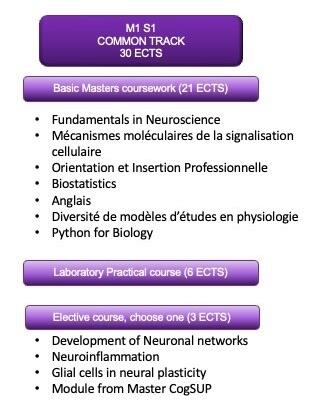
Details about these courses can be found here.
First year 2nd semester
The second semester of the M1 year provides in-depth training in a range of neurosciences topics, both practical and fundamental.
A 2-4 month laboratory research internship closes the semester.
The M1S2 semester includes some options for a limited number of students to undertake training abroad (University of Heidelberg, iMIND ; or the Spring School at IIT Delhi) ; and students planning to study Neuroimmunology in their M2 year will replace one course module with an Immunology module.
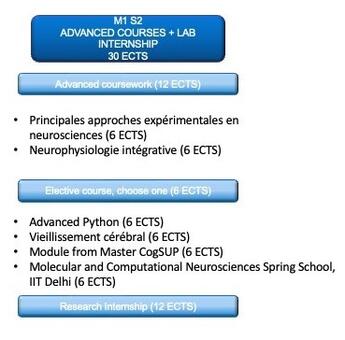
UE obligatoires/ Mandatory courses (12 ECTS)
- MU4BIN018 Principales approches expérimentales en Neurosciences (6 ECTS)
- MU4BI019 Neurophysiologie intégrative (6 ECTS)
Neuroimmunology students replace MU4BI019 with an immunology course:
- MU4BM123 Immunologie fondamentale et intégrée (6 ECTS)
- MU4BM124 Immunophysiopathologie et immunothérapie (6 ECTS)
UE optionnelles/Optional courses (6 ECTS each ; choose one)
- MU4BI021 Vieillissement cérébral
- MU4BI033 Python for physiology modelling
- Molecular and Computational Neurosciences Spring School, IIT Delhi (limited enrollment)
- Module from the Sorbonne Université Master of Cognitive Sciences (CogSUP; approval required)
Elective module (hors contrat):
- MU4BM359 Bioethique (3 ECTS)
Stage/Internship
- MU4BI024 (12 ECTS), internship and poster presentation
Master Second-Year (M2)
General organization
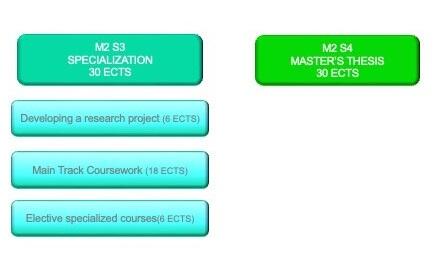
The M2 Neuroscience is designed for each student to acquire in-depth theoretical and practical knowledge in his/her field of interest.
Six different tracks are available, with specifically recommended coursework.
Please see the different track pages for the specific coursework:
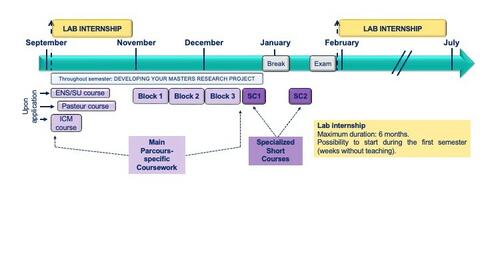
First Semester (M2 S3)
Common coursework : Developing your Masters research project
Preparing the research project
Students in all tracks begin to work on the research project that they will complete during their laboratory internship; this is the module “Developing your Masters research project”. With the help of their internship supervisors, students describe, in a short written document and during an oral presentation, the design and feasibility of their experimental plan to answer the scientific question they will address during their lab internship.
The Neurosciences Master offers 3 courses, with limited enrollment, which take place in September and October, before the main teaching period. These courses replace either one or two modules of main Track/Major-Associated Courses (depending on the associated ECTS).
- Development and Plasticity of the Nervous System, Pasteur course (12 ECTS
- This intensive course, during 5 weeks, covers these topics through lectures and laboratory practicals.
- ENS/SU Course in Neurophysiology (12 ECTS)
- This 4-week course, with laboratory practicals and courses, provides a strong foundation in neurophysiological techniques
- Brain-to-Market ICM course (6 ECTS)
- During an intensive week, students learn to link neuroscience and entrepreneurship through expert presentations and immediate practice: designing, in teams, innovative solutions for patients, families or caregivers.
Students in most track also follow 2 Specialized Short Courses. More than a dozen topics are proposed. Each student chooses 1 course in each series.
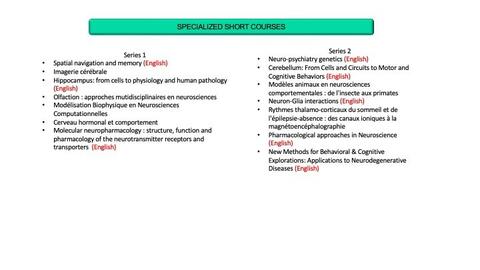
Most coursework is taught in 2-week blocks in November and December. Each track has specific courses, organized in 3 blocks. Students may choose to follow a course from one of the other tracks, for one of the 3 blocks.
Please see the different Track/Major pages for the parcours-specific coursework:
The Master BIP-Neuroscience has developed close collaborations with prestigious foreign partners (University College London, Trinity College Dublin, University of Heidelberg, National Autonomous University of Mexico, University of Pittsburgh) to construct 3 international programs.
DUAL MASTER IN BRAIN AND MIND SCIENCES
INTERNATIONAL MASTER IN NEURODEGENERATIVE DISEASES (iMIND)
INTERNATIONAL MASTER OF VISION SCIENCES (iSENSE)
🚀 Construisez votre AVENIR ! 💡
Vous êtes curieux(se) de l’innovation et de l’entrepreneuriat dans le domaine du vivant (santé, alimentation, environnement) ?
Vous souhaitez transformer vos connaissances scientifiques en opportunités concrètes ?
L’UE AVENIR est faite pour vous !
🔬 Apprenez à…
✅ Comprendre les enjeux du transfert technologique
✅ Lever les freins technologiques, juridiques et réglementaires
✅ Élaborer un business plan à partir d’un projet de recherche
✅ Développer une vision stratégique et économique du marché
🎯 Un enseignement concret et immersif
📢 Cours et tables rondes avec des experts
🛠 Travail en équipe pour construire un projet innovant
💼 Encadrement par des professionnels du transfert de technologie et de la création d’entreprise
🚀 Bénéficiez du statut national d’étudiant-entrepreneur (SNEE)
🎓 Organisation
🔹 15 h de cours en septembre
🔹 45 h de travail en autonomie et encadré jusqu’en décembre
🔹 Travail en trinôme sur un projet réel
🔗 Partenaires prestigieux
Faculté des Lettres de Sorbonne Université, Pépite Sorbonne Université, Celsa, UTC, SATT Lutech et structures privées
📩 15 places seulement ! Sélection sur lettre de motivation et entretien
🎯 Prérequis : Avoir un stage de M2
🔍 Envie d’en savoir plus ? Contactez :
📧 Marie-Noëlle FIAMMA - marie-noelle.fiamma@sorbonne-universite.fr
📧 Nicolas CHIGNARD - nicolas.chignard@sorbonne-universite.fr
Contact
Track directors
Cellular and Integrated Neurosciences (Neurosciences Cellulaires et Intégrées; NCI)
Stephanie Daumas
Richard Belvindrah
Cognitive and Behavioural Neurosciences (Neurosciences Cognitives et Comportementales ; NCC)
Neuroscience of Psychiatric Diseases (Neurosciences des Maladies Psychiatriques ; NMP)
Sensory Neuroscience (iSENS)
Neurodegenerative Diseases (iMIND)
Neuroimmunology
Administration
Veronique De Surirey
Campus Pierre et Marie Curie
Bâtiment C - 1ère étage - Porte 105
9, quai Saint Bernard
Case courrier 118
75252 Paris Cedex 05
